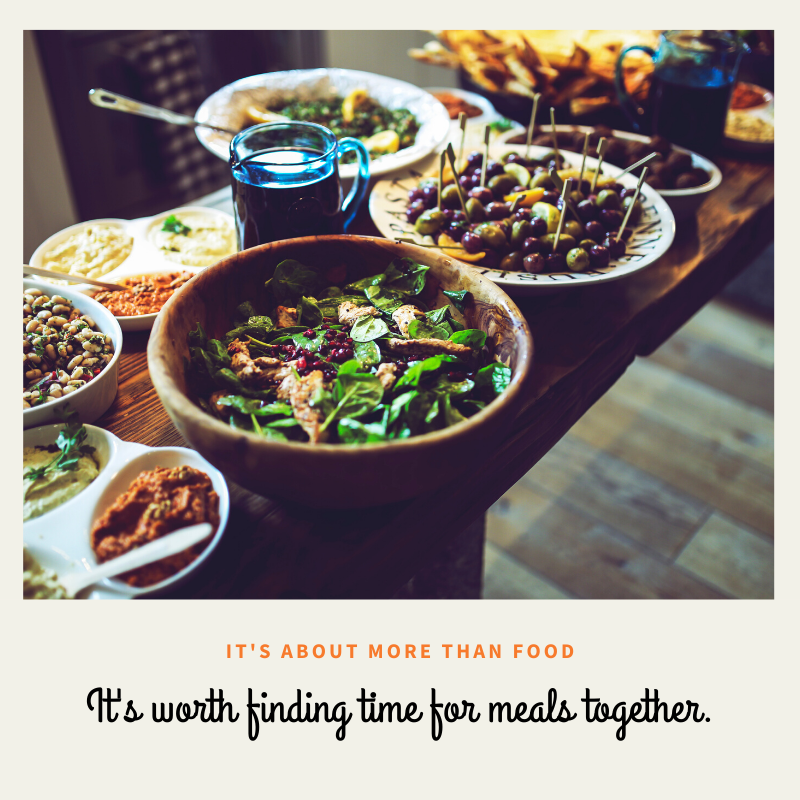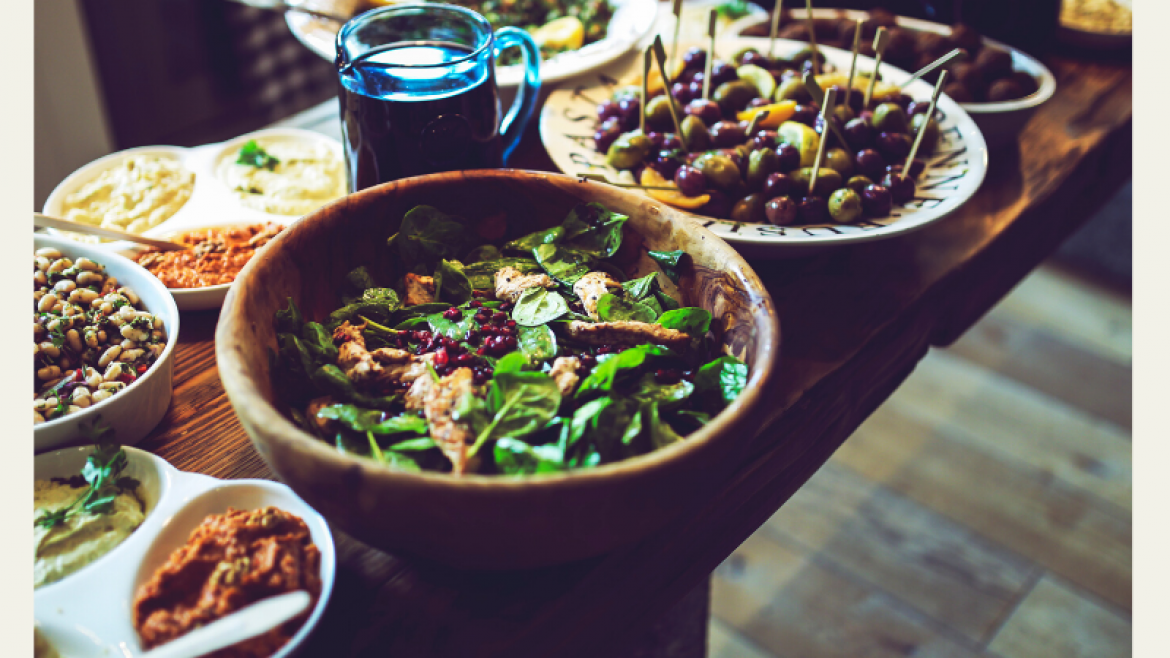With Thanksgiving approaching, even people who rarely cook are preparing to host massive dinners with multiple side dishes and pies.
Our American Thanksgiving idealizes this feast of plenty, but once the dishes are cleared, I invite you to reflect on another component of the tradition: Sitting around a table with family or friends to share a meal.
Thanksgiving isn’t just about what you eat, it’s who you’re with
I believe strongly that meals are about more than stuffing sustenance in your pie hole, but our on-the-go culture has made it increasingly rare to sit down to share a meal. Cody D. Delistraty wrote in
“The Importance of Eating Together” in The Atlantic:
Sadly, Americans rarely eat together anymore. In fact, the average American eats one in every five meals in her car, one in four Americans eats at least one fast food meal every single day, and the majority of American families report eating a single meal together less than five days a week.
…
In America, it seems snobbish to take time to eat good food with one’s family. The Norman Rockwell portrait of the family around the dinner table now seems less middle-class and more haute bourgeois, as many families can’t afford to have one parent stay home from work, spending his or her day cleaning and cooking a roast and side of potatoes for the spouse and kids. Most parents don’t have time to cook, many don’t even know how, and the idea that one should spend extra money and time picking up produce at the supermarket rather than grabbing a bucket of Chinese takeout can seem unfeasible, unnecessary, and slightly pretentious.

Making time for eating together
In “Sunday dinner: The family tradition we need to bring back,” Ronnie Koenig wrote on NBCNews.com about committing to regular extended family gatherings:
Anne Fishel, Ph.D., a family therapist and co-founder of The Family Dinner Project, a nonprofit initiative that encourages families to connect over mealtime, tells me that there are numerous benefits of families eating together. “The benefits range from the cognitive ones (young kids having bigger vocabularies and older kids doing better in school) to the physical ones (better cardiovascular health, lower obesity rates and eating more vegetables and fruits) to psychological ones (lower rates of depression, anxiety, eating disorders, substance abuse and fewer behavioral problems in school).”
One thing I’ve learned about this family dinner tradition is that it takes a little effort, but it’s not insurmountable. We overcome the driving distance by taking turns who’s house we go to — one Sunday it’s Mediterranean by me, the next a BBQ by my sister. It doesn’t take place every single Sunday, but I can now say that I see my mom several times a month, not once a month, and that’s a huge difference.
Studies have shown that older adults thrive and actually live longer when they have consistent social interactions. For my kids, the real-life facetime provides an invaluable connection to the people in the world who care about them the most. And for me, making the opportunity to see family gives me footing, particularly since moving to a town where we didn’t know anyone less than two years ago.
Koenig’s article includes practical pointers for making regular dinners work, including committing to it on your calendar, banning electronics at the table and making the menu easy enough to be realistic, so check it out if you’d like some ideas.
Recognizing that we don’t have the demands on our time that many of our friends do — we don’t have kids, we work reasonable hours, we don’t have lengthy commutes — my husband and I savor our dinners together. We cook together, sometimes elaborate and other times basic meals, and we sit at a proper dining table. We begin our meals by sharing a few reasons we’re grateful that day.
We also love hosting friends for home-cooked meals. As I wrote in my 2011 post “Cooking dinner for someone is a great way to deepen your relationship”:
- Cooking for someone is such a beautiful act of generosity. It’s a gift of your time and attention, even if it’s the final product is something as basic as grilled cheese and tomato soup. When I host, I think about who we’re having over and go shopping with those guests in mind because I want to prepare a meal they’ll enjoy.
- Sharing a meal in someone’s home is intimate. You aren’t surrounded by strangers in a restaurant and paced by a waiter who decides when to take your order and when to drop the bill. You see your host’s surroundings and you can get that wonderful, easy lingering time before and after the meal without feeling you’re holding the table. Want to wait an hour between the main course and dessert? You’ll have a lot more time for conversation, without wondering if the next table over is eavesdropping, and you can ask questions about their books, art work, vacation photos, whatever’s on public display.
- Not everyone knows how to cook. It’s still surprising to me how many New Yorkers take pride in never cooking. Never. Sure, there’s great takeout food to be had here, but that can get expensive and fattening, and it removes an element of connection to your meal. You don’t get the pleasure of making something exactly how you like it, and feeling invested in your mealtime experience. Cooking for guests can show them the pleasure of a shared, home-cooked meal.
Dining together can mean a lot of things. You and your kids. You and your partner. You and your co-workers. Your neighbors. Someone you’d like to get to know better. A friend you don’t see often enough.
Maybe you can start with a shared meal of leftover turkey sandwiches?
If you’d like ideas and inspiration, here are related posts I’ve written:


Leave a reply